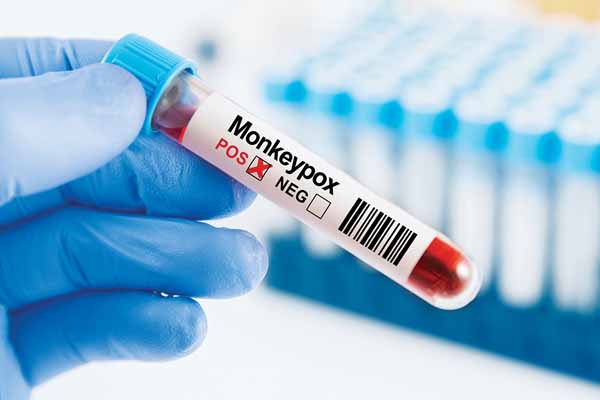
In yet another test to the state’s public health response efforts, monkeypox – rarely seen outside of countries in Africa – has spread rapidly since late spring, and Texas physicians and other health care professionals likely unfamiliar with the virus should remain vigilant for the possibility of cases among their patients.
This kind of advice comes from the Centers for Disease Control and Prevention (CDC), which began investigating its first confirmed case related to the current global outbreak in mid-May, and the Texas Department of State Health Services (DSHS), which reported an uptick in new cases in July.
That same month, the World Health Organization designated the outbreak a global health emergency after tracking more than 16,000 cases across 75 countries. The Biden administration followed suit in August, declaring a national public health emergency, which freed up funds and data-sharing to aid in the response.
“If you feel like things are moving really quickly, that’s because they are,” former DSHS Chief State Epidemiologist Jennifer Shuford, MD, said during a July 20 webinar held by the agency.
The current global monkeypox outbreak is “really unusual” and poses challenges to physicians, many of whom have likely never seen a case of the disease, said Trish Perl, MD. She is a member of the Texas Medical Association’s Committee on Infectious Diseases and a professor of infectious diseases at UT Southwestern Medical Center in Dallas.
Identifying monkeypox
Monkeypox is a rare viral disease linked to the same family of viruses as smallpox, according to CDC. Monkeypox presents symptoms similar to smallpox – including a characteristic rash that may look like pimples or blisters accompanied by fever, headache, muscle aches, swollen lymph nodes, chills, and exhaustion – but is often milder and rarely fatal. It can spread through direct contact with infected people or animals, primarily through skin-to-skin contact.
Although cases in the current outbreak have been largely linked to sexual activity among men who have sex with men, Dallas public health specialist John Carlo, MD, stresses that anyone can contract monkeypox.
“The reality is there’s nothing unique about the risk of monkeypox to people who identify as gay or men who have sex with men,” he said, adding that most Americans lack any protection against infection as routine smallpox vaccinations stopped in 1972.
Those cautions were reiterated at TMA’s Distinguished Speaker Series event in August, where then-DSHS Commissioner John Hellerstedt, MD, discussed the state of public health in Texas.
“Monkeypox is not a sexually transmitted disease. Monkeypox can be transmitted during sexual activity, but monkeypox can be transmitted during any close, prolonged … skin-to-skin contact,” he said. And because unlike COVID-19 it can be transmitted via surfaces from a person with an active rash, nonsexual partners who live in the same household could be at risk of exposure from items like bedding.
In suspected cases, physicians and other health care professionals should obtain specimens for testing, take patients’ sexual and travel histories, and notify their local health departments, according to CDC and DSHS.
Treating monkeypox
Detection isn’t the only challenge facing physicians amid the current outbreak. Dr. Perl says vaccines – which can help prevent monkeypox as pre- and post-exposure prophylaxes – and related treatments are in short supply, which is worrying given the speed with which new cases are reported.
“Epidemiologically speaking … the concern is that we’re perhaps seeing the tip of the iceberg,” she said.
The Biden administration has responded to this concern. In early August, the U.S. Food and Drug Administration (FDA) issued an emergency use authorization (EUA) for the JYNNEOS vaccine, which is licensed to prevent monkeypox. Under the EUA, the vaccine can be administered to eligible adults by intradermal injection, which uses a smaller dose than a subdermal injection and thus extends supply by up to five-fold.
As of this writing, DSHS had received a shipment of nearly 15,000 doses of the JYNNEOS vaccine in July and expected more supply in the fall. The state agency was allocating doses to local health departments to vaccinate people with a documented or presumed exposure to monkeypox. Some Texas counties – among them Harris and Dallas – had already expanded eligibility to include those at high risk of contracting the virus.
DSHS has been urging physicians to work with their local health departments to get eligible patients vaccinated. The American Medical Association has approved new CPT codes for monkeypox testing and vaccination (tma.tips/MonkeypoxCPT).
Although a large supply of the other vaccine, ACAM2000, is available, it isn’t recommended for use in people who are immunocompromised or who have certain health conditions, according to CDC.
Also amid the vaccine supply concerns, Harris County Public Health in late August reported one death of a severely immunocompromised adult who was “presumptive positive” for monkeypox. At press time, it was still unclear what role, if any, the disease played in the death, and the case was still under investigation.
Nonetheless, there is good news: “We want to stress that for the vast majority of people, monkeypox is painful but not life-threatening,” DSHS spokesperson Lara M. Anton told Texas Medicine.
Dr. Hellerstedt also said that most related hospitalizations had been due to pain control.
And despite challenges around vaccine and treatment supply, Dr. Carlo said all of the roughly dozen monkeypox patients he had treated thus far went on to recover.
Notwithstanding the attention on the unusual disease, as of mid-August, monkeypox was largely contained to certain high-risk groups. But Dr. Perl cautions this could change.
“Unless we have a more aggressive response, there’s certainly a risk that it could spread into other populations,” she said. “The fact that people are asking for a much more aggressive response from various health agencies is appropriate.”